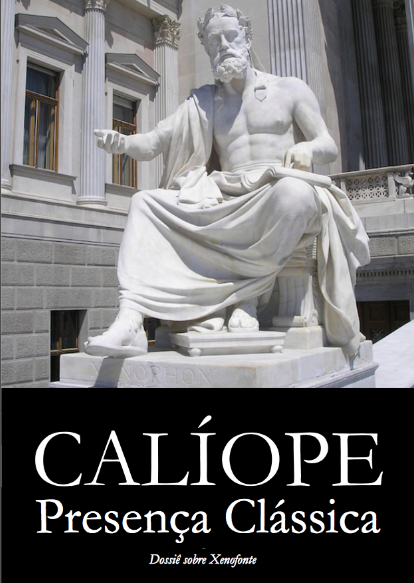TRÊS VIDAS FELIZES NA CIROPÉDIA, DE XENOFONTE
DOI :
https://doi.org/10.17074/cpc.v1i41.39132Mots-clés :
Xenofonte, Ciropédia, tradução, eudaimonia, felicidadeRésumé
Apresentamos, precedida de brevíssima discussão introdutória, a tradução de passagens selecionadas da Ciropédia que têm como tema a vida feliz (eudaimonia). São três vidas distintamente afortunadas retratadas por Xenofonte de Atenas na obra: a do rei lídio Creso (VII, 2.9-20), a do persa Feraulas (VIII, 3.35-50) e, finalmente, a de Ciro, o Grande (VIII, 7).
Références
DANZIG, G. HOBDEN, F., TUPLIN, C (eds.). Xenophon: Ethical Principles and History Enquiry. Leiden/Boston: Brill, 2012.
DORION, L. A. La responsabilité de Cyrus dans le déclin de l'empire Perse selon Platon et Xénophon. Revue Française d Histoire des Idées Politiques, 2002, n. 16, p. 369-386.
GERA, D. L. Xenophon’s Cyropaedia. Style, Genre, and Literary Technique. New York: Oxford University Press, 1993.
GRAY, V. Xenophon's Mirror of Princes: Reading the Reflections. Oxford/New York: Oxford University Press, 2011.
________. Xenophon’s Eudaimonia. In: de LUISE, F.; STAVRU, A. (eds.). Socratica III: Studies on Socrates, the Socratics, and the Ancient Socratic Literature. Sankt Augustin: Academia Verlag, p. 56-67.
HENDERSON, J. Pheraulas Is the Answer, What Was the Question? (You Cannot Be Cyrus). In: HOBDEN, F.; TUPLIN, C (ed.). Xenophon: Ethical Principles and History Enquiry. Leiden/Boston: Brill, 2012, p. 541-562.
IRWIN, E. To whom does Solon speak? Conceptions of happiness and ending life well in the later fifth century (Hdt. 1.29-33). In: GEUS, K.; IRWIN, E.; POISS, T. (ed.). Wege des Erzählens: Logos und Topos bei Herodot. Frankfurt: Peter Lang, 2013, p. 261-321.
________. Debating the happiness of Periclean Athens: from Herodotus' Solon to its legacy in Aristotle. Acta Classica: Proceedings of the Classical Association of South Africa, 2017, vol. 2017, sup. 6, p. 1-41.
LEÃO, D. Sólon e Creso: Fases de Evolução de um Paradigma. Hvmanitas, 2000, vol. LII, p. 27-52.
LEFÈVRE, E. The Question of the Good Life. The Meeting of Cyrus and Croesus in Xenophon. In: GRAY, V. (ed.). Xenophon. Oxford Readings in Classical Studies. New York: Oxford University press, 2010, p. 401-417. (original de 1971).
NADON, C. Xenophon’s Prince. Republic and Empire in the Cyropaedia. Berkeley: University of Califórnia Press, 2001.
SANCISI-WEERDENBURG, H. The Death of Cyrus: Xenophon’s Cyropaedia as a Source for Iranian History. In: GRAY, V. (ed.). Xenophon. Oxford Readings in Classical Studies. New York: Oxford University press, 2010, p. 439-455.
TATUM, J. Xenophon’s Imperial Fiction: On the Education of Cyrus. New Jersey: Princeton, 1989.
XÉNOPHON. Cyropédie – tomes I et II. Texte Établi et traduit par BIZOS, M. Paris: Les Belles Lettres, 2010 (tome I, primeira impressão de 1971) e 2003 (tome II, primeira impressão de 1973).
___________. Cyropédie – tome III. Texte Établi et traduit par DELEBECQUE, E. Paris: Les Belles Lettres, 2003 (primeira impressão de 1978).
Téléchargements
Publiée
Numéro
Rubrique
Licence
Autores que publicam nesta revista concordam com os seguintes termos:
Autores mantém os direitos autorais e concedem à revista o direito de primeira publicação, com o trabalho simultaneamente licenciado sob a Licença Creative Commons Attribution que permite o compartilhamento do trabalho com reconhecimento da autoria e publicação inicial nesta revista.
Autores têm autorização para assumir contratos adicionais separadamente, para distribuição não-exclusiva da versão do trabalho publicada nesta revista (ex.: publicar em repositório institucional ou como capítulo de livro), com reconhecimento de autoria e publicação inicial nesta revista.
Autores têm permissão e são estimulados a publicar e distribuir seu trabalho online (ex.: em repositórios institucionais ou na sua página pessoal) a qualquer ponto antes ou durante o processo editorial, já que isso pode gerar alterações produtivas, bem como aumentar o impacto e a citação do trabalho publicado (Veja O Efeito do Acesso Livre).


